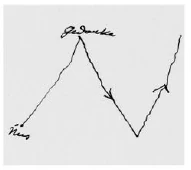Posthumous Essays and Fragments
1879-1924
GA 46
Memo 471-472, undated, circa 1903-1904.
Translated by Steiner Online Library
45. The First, Second and Third Sonship of God
I. The first Sonship of God, the first reflection of the Primordial Existence, which in thought, name and desire proclaims nothing but the Godhead itself; thus it is nothing other than the sole proclaimer of the Only One. Here there is still no question of any differentiation or individualization. What we can perceive in any point of this self-illuminating infinity is only the One God.
World consciousness: The consciousness of the universe has this universe as knowledge.
II. Second Sonship of God, the second reflection of the Primordial Being, which permeates everything with the will to exist and lets the Primordial Spirit shine out of the isolated entities. This will to exist is a unified one. It is the Primordial Spirit, which is not merely, but wills itself. When it wills itself as thought, for instance, it wills itself as a single thought. Thought does proclaim itself; but it proclaims itself as thought, as a member of God.
(It is as if the hand were to say of itself: I am the thought, hand, but I am still only a member of the organism.

The All alone manifests itself in manifold ways. The diversity of beings has become conscious of the All as divine Unity.
Third Sonship of God, the third reflection of the Primordial Being, which permeates everything with individual will and keeps the Primordial Spirit hidden in this isolation. The will to exist is manifold. It is the Primordial Spirit who is not alone and wills not only for Himself, but wills every being. Thus the will of the original spirit becomes perceptible in the individual being, that is, the individual being perceives the will as its own will.
The groaning of the creature.
Evolution as redemption through the unified spirit hovering over the diversity of will.
The spirit, that is the third son. The manifold entities have consciousness of the manifold.
I. In descending order, there is first Jiva, Mahat and Fohat. The All-consciousness proclaims itself through all three elements.
Basic judgment: (All is All) Through the proclamation, the manifold arises.
II. In further descent, the manifold proclaims the divine unity in manifold ways.
(I am All)
III. In the further descent, each manifold thing proclaims itself.
(I am I)
In the further descent, the proclamation becomes objective being.
(Nature is I)
Sensations and mental images are I.
Here we encounter our human self in experience.
Psyche Manas Prana
In the ascending development of the soul, the original punctual I becomes manifold.
(Intuitions are I).
Verbal Sa-Vitarka
Wordless Intuition Nir-Vitarka
We are going through III
As we ascend further, we close our individual consciousness; this individual consciousness (as subject), does not thereby let the special consciousness prevail, but through its passivity, the all-consciousness. It receives the intuitions directly as itself. They now gradually show their own life in the ascending development, no longer as thoughts, but as beings.
We go through II
In the further ascent, the unity of their being is revealed in the diversity of intuitions.
We approach I.
45. Die erste, zweite und dritte Sohnschaft Gottes
I. Erste Sohnschaft Gottes, die erste Widerstrahlung der Urwesenheit, die in Gedanke, Name und Verlangen nichts verkündet als die Gottheit selbst; also nichts anderes ist als alleine Verkünderin des Alleinen. Es ist hier noch von keiner Differenzierung und Individualisierung die Rede. Was wir in irgendeinem Punkte dieser in sich selbst leuchtenden Unendlichkeit wahrnehmen können, ist nur die Eine Gottheit.
Weltbewusstsein: Das Bewusstsein des All hat dieses All zum Wissen.
II. Zweite Sohnschaft Gottes, die zweite Widerstrahlung der Urwesenheit, die alles mit Daseinswillen durchdringt und den Urgeist aus den vereinzelten Wesenheiten erstrahlen lässt. Dieser Daseinswille ist ein einheitlicher. Es ist der Urgeist, der nicht bloß ist, sondern sich will. Indem er sich z.B. als Gedanke will, will er sich als einzelner Gedanke. Der Gedanke verkündet zwar sich; aber er verkündet sich als Gedanke, als Glied Gottes.
(Es ist, wie wenn die Hand von sich spräche: Ich bin die Gedanken, Hand, aber ich bin doch nur Glied des Organismus.)

Das Alleine verkündet sich auf mannigfaltige Weise. Die Mannigfaltigkeit der Wesen hat das All als göttliche Einheit zum Bewußtsein.
Dritte Sohnschaft Gottes, die dritte Widerstrahlung der Urwesenheit, die alles mit Einzelwillen durchdringt und den Urgeist in dieser Vereinzelung verborgen hält. Der Daseinswille ist ein mannigfaltiger. Es ist der Urgeist, der nicht bloß ist und nicht bloß sich will, sondern der jedes Wesen will. Wahrnehmbar wird also das Wollen des Urgeistes in dem Einzelwesen, d.h. das Einzelwesen nimmt das Wollen als sein Wollen wahr.
Das Stöhnen der Kreatur.
Evolution als Erlösung durch den einheitlichen, über der Mannigfaltigkeit des Willens schwebenden Geist.
Der Geist, d[as] i[st] der dritte Sohn. Die mannigfaltigen Wesenheiten haben das Mannigfaltige zum Bewusstsein.
I. In absteigender Linie findet sich zuerst Jiva, Mahat und Fohat. Das Allbewusstsein verkündet durch alle drei Elemente sich selbst.
Grundurteil: (All ist All) Durch die Verkündigung entsteht das Mannigfaltige.
II. Im weiteren Absteigen verkündet das Mannigfaltige die göttliche Einheit in mannigfaltiger Weise.
(Ich bin All)
III. Im weiteren Absteigen verkündet jedes Mannigfaltige sich selbst.
(Ich bin Ich)
Im weiteren Absteigen wird die Verkündigung objektives Sein.
(Natur ist Ich)
Sinnesempfindungen und Verstandesvorstellungen sind Ich.
Hier treffen wir in der Erfahrung unseren Menschen.
Psyche Manas Prana
Bei der aufsteigenden seelischen Entwicklung vermannigfaltigt sich das ursprüngliche punktuelle Ich.
(Intuitionen sind Ich.)
Verbale Sa-Vitarka
Wortlose Intuition Nir-Vitarka
Wir gehen durch III
Im weiteren Aufsteigen schließen wir unser Einzelbewusstsein; dieses Einzelbewusstsein (als Subjekt), lässt dadurch nicht das Sonderbewusstsein, sondern durch seine Passivität das Allbewusstsein walten. Es empfängt die Intuitionen unmittelbar als sie selbst. Sie zeigen nunmehr bei der aufsteigenden Entwicklung graduell ihr Eigenleben, nicht mehr als Gedanken, sondern als Wesen.
Wir gehen durch II
Im weiteren Aufsteigen enthüllt sich in der Mannigfaltigkeit der Intuitionen die Einheit ihres Seins.
Wir nähern uns I.

